- Home
- John Bellairs
The House With a Clock in Its Walls Page 6
The House With a Clock in Its Walls Read online
Page 6
After what seemed like a long time, Lewis became aware of a figure standing off to their right. A tall skinny man in a cocked hat and a black cutaway coat.
Lewis recognized him immediately. It was Wellington. He looked exactly the way he did in John Clark Ridpath's History of the World.
Wellington scanned the horizon with his telescope. Then he sadly clicked the telescope shut and took out his watch. The watch, which resembled the one Mrs. Zimmermann wore on a chain, dinged eight times. Wellington rolled his eyes toward the sky, put his hand on his heart, and said gravely, "Oh, that Bluecher or night would come!"
"Why did he say that, Uncle Jonathan?" asked Lewis. He had looked at all the illustrations in Ridpath's book, but he had never read the account of the battle.
"Bluecher is a Prussian general who is coming to aid Wellington," said Jonathan. "Napoleon has sent Grouchy off to keep Bluecher busy."
Lewis giggled. "Why is he called Grouchy?"
"Because that's his name," said Mrs. Zimmermann. "Only it's pronounced Groo-shee because it's a French name. Fat Ears here knows that, but he's trying to be funny. Well, Jonathan, do you think Wellington will win this time?"
"Dunno, Florence. Wait and see."
Since it was Jonathan's illusion and not the real battle, and since he was feeling silly that evening, he decided to let Napoleon win for a change. Night fell with a clunk like a book falling out of a bookcase, but Bluecher did not come. The blue arrows sliced into the red squares, split them up, tore them to pieces. Now the blue arrows turned into an army marching up the hill, an army of tall men wearing bearskin hats that made them even taller. They had long black moustaches and carried muskets with bayonets on the end. They were coming for Wellington, who now looked very red-faced and crabby. He tore off his hat and stomped on it. He threw his watch on the ground and stomped on it too.
"Ooh-waah!" he screamed, "Greenwich Mean Time! Very mean time! I want to go home now!"
Whereupon the scene changed, and Lewis and Uncle Jonathan and Mrs. Zimmermann were back in the dark shadowy dining room by the warm fire. The purple china clock on the mantel whanged tinnily eleven times. The whole show had taken only an hour.
Jonathan got up, stretched, yawned, and suggested that they all go to bed. Lewis thanked Mrs. Zimmermann for the wonderful party and went home with Jonathan. He went upstairs to bed, but he did not sleep.
CHAPTER FIVE
As the luminous hands of his new Westclox bedside clock crept around toward midnight, Lewis lay, fully dressed, under his covers. The room was dark. His heart was pounding, and he kept saying over and over to himself, "I wish I didn't have to do it. I wish I didn't have to do it."
He felt in his pants' pocket for the piece of paper with the magic circle copied on it. There was a fat piece of yellow chalk in his other pocket. What if Uncle Jonathan came to his room to see if he were all right? He'd just have to pull the covers up to his chin and pretend that he was asleep. Tick-tick-tick-tick. Lewis wished that it was next week, and that he had never made his stupid promise to Tarby. He closed his eyes and stared at the patterns that formed on the insides of his eyelids.
Minutes passed. Suddenly Lewis sat up. He threw back the covers and stared at the clock. It was five minutes after twelve! He had promised to meet Tarby in the cemetery at midnight, and now he was going to be late! What could he do? Tarby wouldn't wait for him. He would go home, and tomorrow he would tell all his friends how Lewis had chickened out.
Lewis rubbed his face and tried to think. The cemetery stood atop a long ridge that rose just on the other side of Wilder Creek Park. You had to walk half a mile beyond the city limits to get to the road that ran up the ridge. There was a short cut, of course, but Lewis hadn't intended to take it. Now he had no choice.
Slowly, carefully, Lewis eased himself down onto the floor. He knelt down and groped under the bed for his flashlight. It was a long, old-fashioned flashlight with a fluted handle and a big round lamp on the end. The metal felt cold and slimy in his hand. He went to the closet and put on his heavy jacket. It would be cold up on Cemetery Hill.
Lewis opened the bedroom door. The hall was dark, as usual, and from the next room he could hear Uncle Jonathan snoring. Lewis felt awful. It was like being sick to your stomach. He wished with all his heart that he could run into Jonathan's room, wake him up, and tell him all about the adventure he was going on, and why he had to go through with it. But he didn't do any of these things. Instead, he tiptoed across the hall and opened the door that led to the back stairs.
It didn't take long for Lewis to get to the other side of town. When he had reached the CITY LIMITS sign, he poked around by the side of the road until he found a little wooden staircase that ran down the gravel bank to Wilder Creek Park. The creek was fairly shallow at this point, so Lewis waded across. The water was freezing on his ankles. When he got to the other side he looked up. His hands felt sweaty, and he almost turned around and went home.
He was looking at Cemetery Hill. It was a high, flat-topped ridge cut across in two places by a narrow dirt road. It wasn't a hard hill to climb: New Zebedee children went up and down it every day during the summer. But to Lewis, who was scared of heights, it might as well have been Mount Everest.
Lewis looked up at the dark hill, and he swallowed a couple of times. Maybe if he took the long way around... no, he was already late, and Tarby might get bored and go home. The last thing Lewis wanted was to be in the cemetery alone at this time of night. He got a tight grip on his flashlight and started to climb.
At the first landing, Lewis stopped. He was breathing hard, and the front of his jacket was soaked through.
There were black smudges on the knees of his trousers, and there was a twig in his shoe. Two more stages. Lewis gritted his teeth and went on.
At the top of the hill, he dropped to his knees and crossed himself several times. The sweat was running down his face, and he could feel his heart thumping. Well, he had done it. It was no great triumph because Tarby had probably scaled the ridge in a tenth of the time it had taken him. But at least he had done it.
Lewis looked around. He was standing at the edge of a long avenue lined with willow trees. The bare strings of the willows swayed in the wind, and Lewis shivered. He felt very cold and very alone. At the far end of the avenue, the gray gate of the cemetery glimmered. Lewis started to walk toward it.
The cemetery gate was a heavy arch of stone covered with elaborate carving. On the lintel were inscribed these words:
THE TRUMPET SHALL SOUND AND
THE DEAD SHALL BE RAISED
Lewis pushed open the squeaky iron gate and walked quickly past the rows of white headstones. The mausoleum was on the other side of Cemetery Hill, the side that looked out across the deep valley beyond the town. A little narrow path led down to the stone platform in front of the tomb door. Where was Tarby?
As Lewis looked around, someone said, "Boo!" Lewis almost fainted. It was Tarby, of course, hiding in the shadow of the stone arch on the front of the mausoleum.
"Hi! You sure took long enough," said Tarby. "Where were you?"
"It was hard work climbing," said Lewis, staring sadly down at his wet and dirty trousers.
"It's always hard climbing for fatsoes," said Tarby. "Whyncha lose some weight?"
"Come on, let's do what we're supposed to be doing," said Lewis. He felt depressed.
The cracked and mossy stone slab that lay at the doorstep of the tomb was in the shadow of the hillside now. Everything around it lay in bright moonlight. Lewis turned on the flashlight and played the pale beam over the ugly iron doors. A heavy chain held the doors together, and it was fastened by a large, heart-shaped padlock. Lewis flashed the beam up. There was the strange-looking O on the cornice. The wind had died down. Everything was quiet. Lewis handed the flashlight to Tarby and knelt down. Out came the scrap of paper and the chalk. He drew a big circle and then a smaller one within it, like this:
As Tarby held the flashlight steady, Lewis
filled in the border of the magic circle with symbols from the piece of paper. When he had chalked in the last strange sign, there was still a blank space in the border. Lewis had read in Jonathan's book that you were supposed to fill in the space with the name of the dead person. But he didn't know the name.
"Well," said Tarby, "I don't see any dead people."
"It's not finished," said Lewis. "We've got to put in the name."
Tarby looked disgusted. "You mean you don't know it?"
"No, I don't," sighed Lewis. "Maybe if we sit here for a minute or two it will come to us."
They knelt silently at the door of the tomb. A sudden gust of wind rattled the dead leaves on an oak tree that grew nearby. Minutes passed. Lewis's mind was completely blank. Then, for some reason, he picked up the chalk.
"Hold the flashlight down here," he said.
Slowly, carefully, he spelled out a name. The funny thing was that he was not thinking of a name at all. It was as if someone else was guiding his hand. With one last down-stroke of the chalk he completed the word: Selenna. It was a strange name. Lewis had never known anyone called Selenna. He didn't even know how to pronounce the name. But there it was.
He stood up with the creased paper in his hand. Now he started to chant in a high-pitched nervous voice: Aba bebe bachabe...
He stopped. Tarby, who was crouched beside him, grabbed his arm and squeezed it hard. From deep within the tomb came a sound. Boom! A deep hollow sound. The iron doors jolted, as if they had been struck a blow from inside. The chain rattled, and there was a clunk on the pavement. The padlock had fallen off. And now, as the boys knelt, terrified, two small spots of freezing gray light appeared. They hovered and danced before the doors of the tomb, which now stood ajar. And something black—blacker than the night, blacker than ink spilled into water—was oozing from the space between the doors.
Tarby shook Lewis and squeezed his arm harder. "Run!" he shouted.
They tumbled over the bank and started to scramble down the hillside. Part of the way Lewis slid on his belly, with roots scratching at his face. He clawed at the wet slippery grass, but he could not get a handhold. Then he was tumbling over and over, and then he was sliding on his back. Rocks scraped his shoulder blades and bumped the back of his head. And then he was sitting on the dirt road, thoroughly shaken and sick and scared.
The moon drifted out from behind a thin veil of clouds and stared down at Lewis as if it were scared too. Tarby was sprawled near him in a weedy ditch. He got up quickly and stared back up the hillside. Now he was tugging at Lewis's arm. "Come on! We've got to get out of here! It might come after us! Oh, come on! Please come on!"
Lewis was dazed and shaken, but he got up and followed Tarby over the next stage of the hillside, and the next one. They waded across the stream and were soon on the gravel road that led back to New Zebedee.
As they walked along, Lewis kept stopping and shuddering. Tarby told him to quit it.
"I can't help it," said Lewis in a sick voice. "Did you see it? It was awful!"
"I don't know what I saw," said Tarby sullenly. "Maybe it was the moonlight or something."
Lewis stared at him. Was Tarby kidding, or was he trying to deny to himself that he had seen what he really had seen? Lewis didn't know, and he didn't care. All he knew was that he was terribly frightened.
Lewis sneaked back into the house a little before three a.m. He tiptoed up the back stairs, checked to make sure that his uncle was asleep—he was—and quietly opened the door of his own room. Just as quietly, he shut it behind him. Then he slowly began to strip off his wet and dirty clothes, which he wadded up and threw into a dark corner of his closet. Where was his flashlight? Tarby must have taken it. He would get it back from him later. As for the clothes, he could get them cleaned without Jonathan knowing about it.
Lewis went to bed. He tried to sleep, but all he could see when he closed his eyes were those two burning circles of light. Finally he did drift off, but he had a strange dream. Clock hands and skeleton bones were chasing him around and around a high stone tomb. Lewis awoke with a start and, for a moment, it seemed that his room, and the whole house, was filled with a loud ticking noise.
CHAPTER SIX
The next morning, when Lewis came down to breakfast, Uncle Jonathan was reading an article on the front page of the New Zebedee Chronicle. Curious, Lewis leaned over his shoulder and this is what he read:
TOMB DESECRATED BY VANDALS
Answers Sought to Senseless Act
Last night vandals broke into the Old Izard mausoleum in Oakridge Cemetery. The doors of the tomb were found standing ajar, with the padlock lying shattered on the pavement. This incident has sadly marred what was otherwise a Halloween remarkably free from incidents of vandalism and wanton destructiveness. What these human ghouls hoped to attain lies mercifully beyond conjecture, but it may be hoped...
"Morning, Lewis," said Jonathan, without looking up. "Did you sleep well?"
Lewis turned pale. Did Jonathan know?
Mrs. Zimmermann was sitting across the table, munching her Cheerios. "Does it say whether they disturbed the coffins?" she asked.
"No, it doesn't," said Jonathan. "The caretaker probably just shoved the doors shut and fastened them with a new padlock. I don't blame him. I wouldn't want to look inside old Isaac Izard's tomb."
Lewis sat down. There were too many things whirling around in his head, and he was trying to get them straightened out.
"I... I was up in the cemetery with Tarby a couple of times, Uncle Jonathan," he said cautiously, "but I didn't see any tomb with 'Izard' on it."
"Oh, well, he didn't want his name on the tomb. When he had it fixed up for his wife's body, he brought in a stonecutter who chiseled off the family name and carved an omega."
"An omega?" said Lewis. "What's that?"
"It's the last letter of the Greek alphabet, and it's used a lot by wizards. It looks like an O, except that it's open at the bottom. It is the sign of the Last Judgment—the End of the World."
Lewis sat there staring at the little O's floating in his bowl. He forced himself to eat a few of them.
"How come he wanted something like that on his tomb?" asked Lewis. He was trying to conceal the tremble in his voice.
"Lord knows, Lewis," said Jonathan. "Say, you're not scared about this tomb-breaking business, are you? Old Isaac Izard's dead and gone. He's not going to bother us."
Lewis looked at Jonathan. Then he looked at Mrs. Zimmermann. He knew, as well as he knew anything, that they couldn't wait for him to go off to school so they could discuss the matter alone. So he finished his breakfast, mumbled goodby to them both, grabbed up his books, and left.
Jonathan and Mrs. Zimmermann did indeed want to discuss the break-in alone. Any tampering with the tomb of two powerful wizards like Isaac and Selenna Izard was a matter for serious discussion, and they didn't want to frighten Lewis with their talk. But they had no idea of what Lewis had done. Jonathan was not in the habit of peering in at the sleeping form of his nephew during the night, so he had no idea that Lewis had been out of the house. Of course, he and Mrs. Zimmermann had been concerned for some time about Lewis's strange behavior. But they did not connect it with what had happened on Halloween night.
After their discussion—which came to no conclusions at all, except that there was dirty work afoot—Jonathan and Mrs. Zimmermann decided that it would be nice to take Lewis on an evening ride around Capharnaum County. They knew he loved to ride, and since they hadn't taken him out in some time, they thought that maybe an excursion would shake some of the gloom out of his system.
But when Lewis came home from school that day, he was depressed and worried. He had been thinking about the tomb business all day long. So, when Jonathan pushed back his chair after dinner and asked Lewis if he'd like to go for a nice long ride, Lewis merely shrugged his shoulders and said, "Yeah, I guess I'd like to go" in a dying-cat sort of voice.
Jonathan stared at Lewis for a minute, but he said
nothing. He merely got up and went to get his car keys. Soon all three of them—Jonathan, Mrs. Zimmermann, and Lewis—were crammed into the front seat of Jonathan's 1935 Muggins Simoon, a big black car with running boards and a windshield that could be cranked open. The car, spewing clouds of bluish smoke, backed down the rutted driveway and into the street.
They drove for hours, as the afterglow of sunset stayed and stayed, and the hollows filled with purple mist. They drove past barns with big blue signs on their sides that said: CHEW MAIL POUCH. They drove past green John Deere tractors parked in deep muddy ruts. Up hill and down hill they drove, over bumpy railroad crossings with X-shaped signs that said: RAIL-SING CROS-ROAD if you read them the wrong way, through little towns that were no more than a church, a food store with a gas pump outside, and a flagpole on a triangle of green grass where the roads met. By the time it got dark, they were miles from New Zebedee.
They were on their way home when—for no reason that Lewis could see—Jonathan stopped the car. He turned off the motor and sat there staring at the row of green dashboard lights.
"What's wrong, Uncle Jonathan?" asked Lewis.
"I keep imagining that I hear a car somewhere," said Jonathan. "Do you hear it, Florence?"
"Yes, I do," said Mrs. Zimmermann, giving him a puzzled look. "But what's so odd about that? They do let people drive these roads at night, you know."
"Do they?" said Jonathan in a strange voice. He opened the car door and stepped out onto the gravel. "Stay here," he said to them. He walked up the road a little ways and stood there, listening. Even with the car door open, Lewis could hear nothing but the wind in the roadside trees and the clattering of a tin sign on a barbed-wire fence. The car was parked near the top of a high hill, and now Lewis could see headlights rising out of a gully and then dipping into the next one.
Jonathan came running back to the car. He slammed the door and started the motor. With a squealing of tires, he turned the car around and headed back the way they had come.

 The Curse of the Blue Figurine
The Curse of the Blue Figurine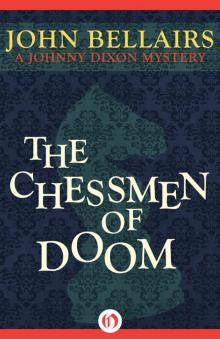 Chessmen of Doom
Chessmen of Doom Secret of the Underground Room
Secret of the Underground Room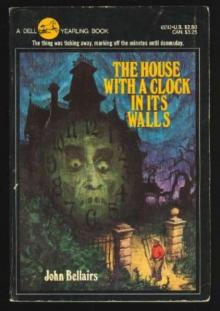 The House With a Clock in Its Walls
The House With a Clock in Its Walls The Vengeance of the Witch-Finder
The Vengeance of the Witch-Finder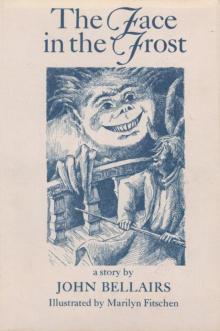 The Face in the Frost
The Face in the Frost Revenge of the Wizard's Ghost
Revenge of the Wizard's Ghost Spell of the Sorcerer's Skull
Spell of the Sorcerer's Skull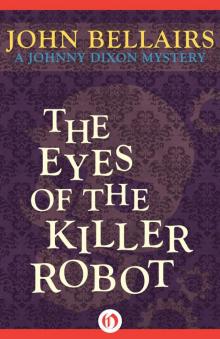 Eyes of the Killer Robot
Eyes of the Killer Robot Mummy, the Will, and the Crypt
Mummy, the Will, and the Crypt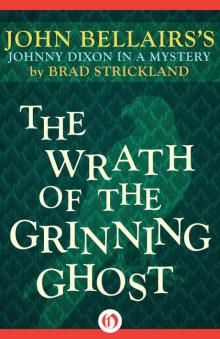 Wrath of the Grinning Ghost
Wrath of the Grinning Ghost The Mansion in the Mist
The Mansion in the Mist The Doom of the Haunted Opera
The Doom of the Haunted Opera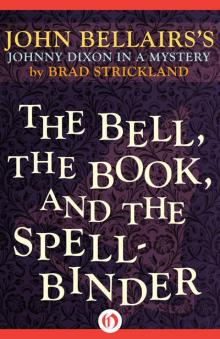 The Bell, the Book, and the Spellbinder
The Bell, the Book, and the Spellbinder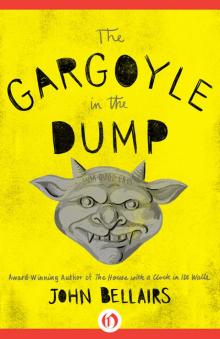 The Gargoyle in the Dump
The Gargoyle in the Dump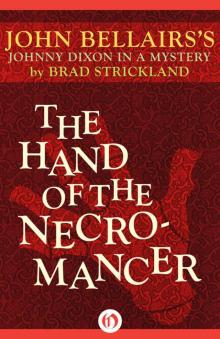 The Hand of the Necromancer
The Hand of the Necromancer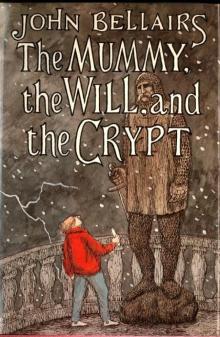 The Mummy, the Will, and the Crypt
The Mummy, the Will, and the Crypt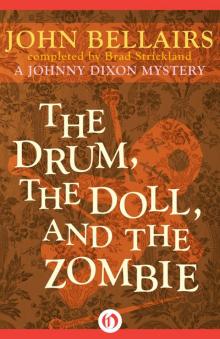 Drum, the Doll, and the Zombie
Drum, the Doll, and the Zombie The Specter from the Magician's Museum
The Specter from the Magician's Museum The Letter, the Witch, and the Ring
The Letter, the Witch, and the Ring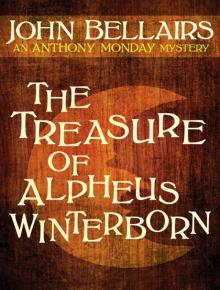 The Treasure of Alpheus Winterborn
The Treasure of Alpheus Winterborn The Dark Secret of Weatherend
The Dark Secret of Weatherend The Figure in the Shadows
The Figure in the Shadows